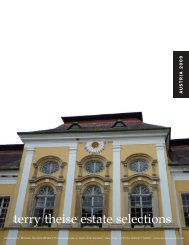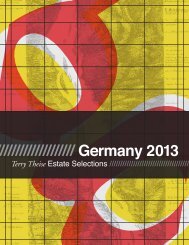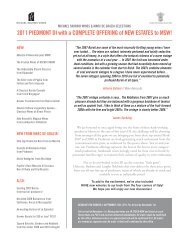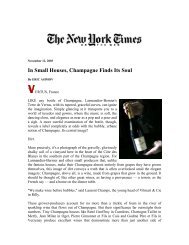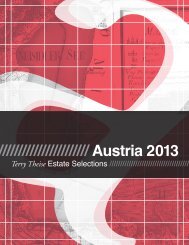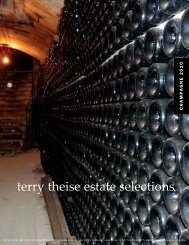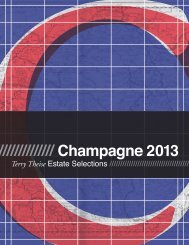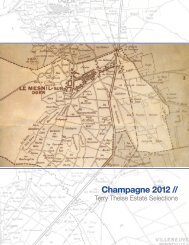German Catalog 2006 USE THIS ONE.qxp - Michael Skurnik Wines
German Catalog 2006 USE THIS ONE.qxp - Michael Skurnik Wines
German Catalog 2006 USE THIS ONE.qxp - Michael Skurnik Wines
You also want an ePaper? Increase the reach of your titles
YUMPU automatically turns print PDFs into web optimized ePapers that Google loves.
26<br />
“Antiques”<br />
2001 has modestly shuffled off the stage now, and<br />
one doesn’t get it to taste. Yet every time I did I was reaffirmed<br />
in my certainty of its fundamental greatness.<br />
2000 remains a kind of tragic watershed; tragic<br />
because of the egregious effort that went into making it;<br />
watershed because with this vintage we gleaned the<br />
great Change. No such wines could have been made in<br />
those conditions 30, 20, even 10 years ago. The best 2000s<br />
are immensely worthwhile wines. I sat drinking Riesling<br />
one afternoon with Laura and Jay from House & Garden,<br />
and noted with pleasure how fine the 2001 Leistenberg<br />
Kabinett from Dönnhoff was showing. “Um, Terry, the<br />
label says 2000,” said Jay. Oh c’mon Jay; don’t distract my<br />
flow of rhetoric with anything so mundane as the facts!<br />
But this 2000 was indeed lovely, as many of them are.<br />
But do drink them soon. They are fragile and they<br />
won’t make old bones, most of them. Also, drink them up<br />
when you open a bottle. This is not a vintage you can<br />
keep for days in the fridge. They have high pH and are<br />
subject to volatile acididy.<br />
1999 is as good as forgotten, bland creature that it<br />
was, yet again it’s often just these vintages that return to<br />
amaze us in 20 years. Think of ‘86, ‘79, ‘73.<br />
Something I enjoy is to pull an old bottle of a TT-<br />
Selection from my cellar, and enjoy it like a “civilian,” like<br />
in the old days before I was a professional swirl ‘n hurler.<br />
I can’t remember them individually any more (a lifetime<br />
of rock and roll and those days are gone, man) and I could<br />
look them up in an old catalog, but I usually don’t. When<br />
they’re singing, as they almost always are, I think how<br />
good it is to have been part of such a chain of pleasure.<br />
1998 continues its perplexing journey to who-knowswhere.<br />
I started noticing a vegetal grassy tartness creeping<br />
into some of them, but it seems to have disappeared. The<br />
quality of fruit and aroma in the young wines was captivating,<br />
the loveliest of the three best years of the 1990s (‘90, ‘96,<br />
‘98), and hints of that charm begin to re-emerge. So we’ll<br />
see. Many sage old growers insist the greatest wines zigzag<br />
their way to maturity and often have truculent stages.<br />
1997 is the most surprising of recent vintages. The<br />
wines have slimmed down and found a lyric fruit that<br />
has built on its early prettiness. It’s a better vintage than<br />
I thought it to be in general; the great wines were apparent<br />
at the start. If you own them it’s a fine time to visit<br />
them. 1997 should always be an unfussy fruit-driven vintage,<br />
but it’s more than merely pretty. I suspect it will age<br />
gracefully, and be consistently graceful while aging.<br />
1996 is deep in hibernation. It was fascinating to start<br />
tasting the 1996 Champagnes just at the time the <strong>German</strong><br />
wines of that vintage were at their least forthcoming. To<br />
some extent the evolution of many 1990s is a harbinger for<br />
the development of the 1996s, though 1990 has more density<br />
and body. My guess as of today: there will be more great<br />
1990s than 1996s, but the best 1996s will be the best wines of<br />
all. Call me out on this foolhardy forecast when I’m an old<br />
coot. Indeed 1996 can be seen as a test case for acidity, and<br />
we’ll see how those spiky acids resolve in the fullness of time.<br />
Things I Would Do If I Were<br />
Ruler Of All The Known World<br />
First, either do away with cork or find a way to<br />
neutralize its damage. I am fed up with the number of<br />
corked bottles of <strong>German</strong> wine I encounter. Yes, outright<br />
stinkers are rare, but these aren’t as scary as the<br />
subtly corked wine, where something indistinct is<br />
making the wine taste mute, furry, stale.<br />
The <strong>German</strong>s were—characteristically—slow to<br />
adapt at first. I get a chuckle whenever a grower laments<br />
the problem of cork—at his neighbor’s winery! Most of<br />
them are certain their corks are of the highest quality.<br />
“When was the last time you had a corked bottle of<br />
mine?” they’ll demand. “Um, does yesterday count?” I<br />
reply. But things seem to be changing quickly.<br />
Now the topic is which alternative closure to use.<br />
One guy worries about stelvins (“I don’t like my wine<br />
being in contact with aluminium for so many years,” he<br />
says.) while another observes “Since you Americans<br />
seem to have this thing about sulfur, maybe stelvins<br />
aren’t the best closure . . .” to which I could only reply it<br />
isn’t all Americans, just two or three, one of whom’s half-<br />
Euro anyways. There’s a very foxy device called Vino-lok<br />
which is a glass cork and which I like. Rumpf’s using<br />
crown corks. We do not urge them to change, but we tell<br />
them we welcome any change they consider making—<br />
except plastic.<br />
Here’s something else I’d do; remove the spurious<br />
glamour attending to “flying winemakers.” I’m not<br />
sure why it’s sexy for someone to ride a plane to go<br />
somewhere else to make wine. I appreciate wanderlust.<br />
But I’m happier when someone chooses a place and<br />
makes wine there, ideally the place he was born and<br />
raised. He then becomes linked to his place and his<br />
wine expresses the connection. The connection gives it<br />
Just say no to corks.<br />
significance. Otherwise wine becomes a plaything (a<br />
thing, period). Johannes Selbach certainly racks up as<br />
many frequent-flier miles as any human I know, yet I<br />
cannot imagine him starting a wine “project” (the word<br />
makes me wince) in New Zealand or Yunnan province.<br />
He is a Moselaner; therefore the wine he makes is<br />
Mosel wine.



